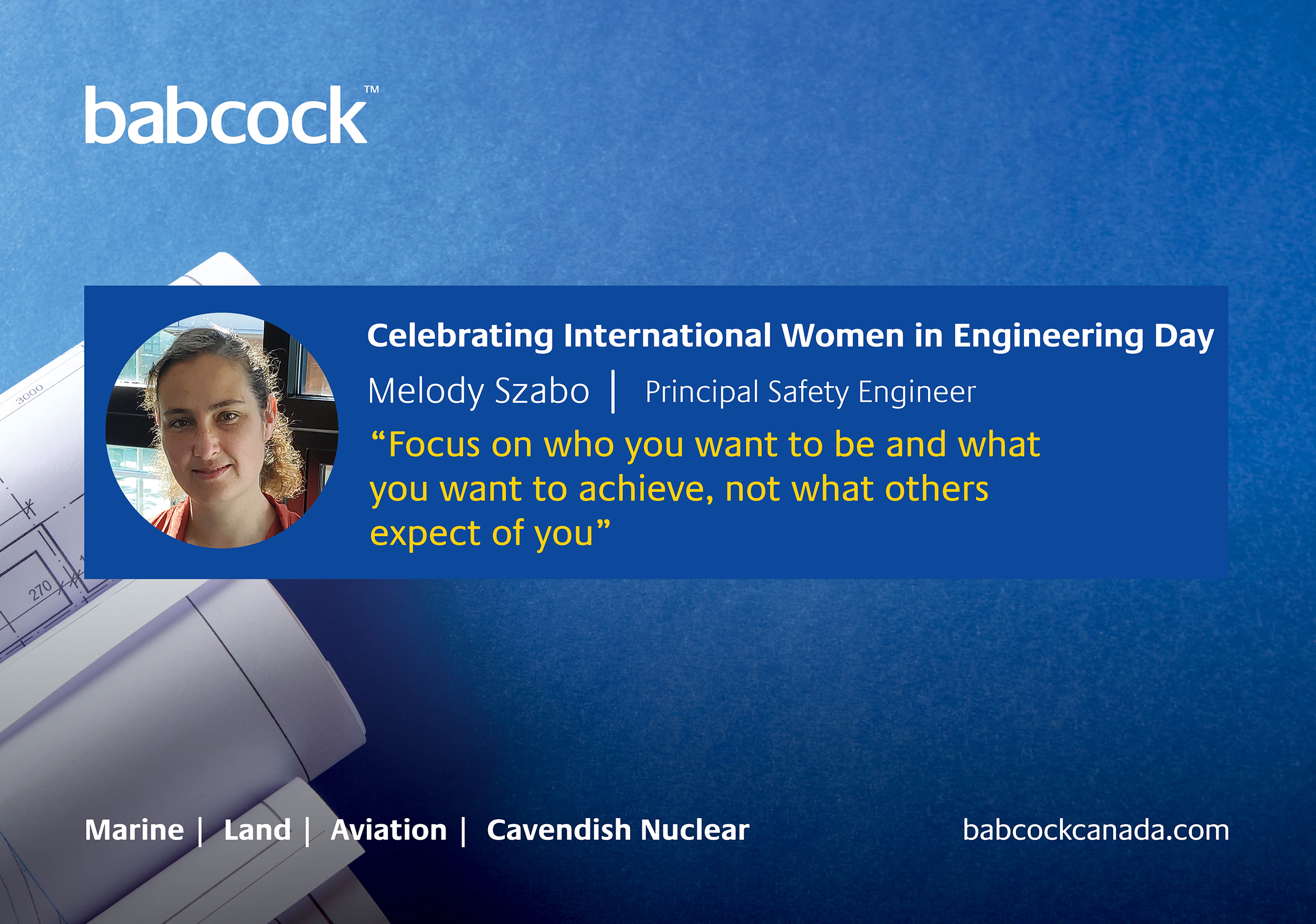
International Women in Engineering Day – Let’s Meet Melody Szabo
Each year, Babcock acknowledges International Women in Engineering Day as an opportunity to celebrate the talented and hard-working women who are an integral part of our business. With diversity, comes new and bright ideas. We are extremely fortunate for our diverse teams, along with the ability to empower women to be a part of our engineering family.
This year we’re spotlighting Melody Szabo, who was recently promoted to Principal Safety Engineer. To celebrate this day and shed light on the women in this industry, Melody responded to a number of interview questions giving us insight as to her experience working as an engineer here at Babcock, along with inspiring answers about the challenges she has faced, and advice for women wishing to join the engineering field.
Q: When did you join the Babcock team?
MS: Just over two years ago, May 2019.
Q: What is your role within Babcock?
MS: I spent most of this time as a Senior Mechanical Engineer. In that role I provided Mechanical Engineering support to Victoria Class-wide challenges, such as determining requirements for new equipment selection and designs, or for obsolescence issues, advising our clients on areas of technical policy improvement, and updating technical documentation for integration of new equipment.


During my time as a Senior Mechanical Engineer, I started taking on Safety and Human Factors Engineering work in support of managing air quality onboard the Victoria Class submarines, and assessing safety issues with material selections and new designs. I was recently promoted to Principal Safety Engineer. Now I get to focus more of my energy on the Safety Engineering aspects of supporting Canada’s submarines.
Q: What does a typical day on the job look like for you?
MS: There is not really a “typical day” for me. The challenges I solve on any day range from straightforward with a narrow focus, to complex and vague, and I often have to balance competing priorities and deadlines. Two examples of things I am working on right now are assessing a replacement material for an obsolete seal on a piece of equipment, and determining the impact of a proposed design on the submariner’s ability to reach equipment to fight a fire or escape a space. Most of my work is from a desk, but there are times I need to go onboard the submarine to look at a system, a piece of equipment or a space layout in order to make a determination or recommendation.
Q: What engineering stream did you pursue and why?
MS: I started with an undergraduate degree in Chemical and Materials Engineering and then went into the Royal Canadian Navy as a Marine Systems Engineering Officer, where I got lots of experience and training in Marine Systems Engineering. I completed a Master’s Degree in Marine Engineering, and my combination of education and experience led me naturally towards focusing on the Safety and Human Factors aspects of Engineering.
Q: What inspired you to pursue engineering?
MS: I have always had a natural curiosity for how things work, and I like being able to visualize how things work together and try to come up with options and solutions to improve things and to solve challenges, especially where the answers are not obvious.
Q: What is the hardest challenge you have had to overcome during your career as an engineer?
MS: I think finding the balance between trying to fit into the mold of what a successful engineer “looked like” and being true to myself and trusting my own instincts and capabilities was probably the hardest part for me. It took me a long time to realize that I could establish my competence by focusing on being what I thought a good engineer should be, not necessarily what anyone else thought that should look like. I hope that as greater numbers of people who are not the typical male stereotype of an engineer succeed in the workforce, this becomes easier for everyone entering into the field.
Q: What is your favourite part about working at Babcock?
MS: I really enjoy working with the people I’ve met in Babcock. There is a lot of talent, creativity and energy amongst the other engineers, project managers and other specialists I’ve been able to work with.
Q: What’s one piece of advice you wish you could give to your younger self?
MS: Focus on who you want to be and what you want to achieve, not what others expect of you.
Q: What skills are the most important to succeed as an engineer.
MS: I would say the most valuable skills are good communication and teamwork (I know that’s two, but they are really closely related) – it sounds pretty basic, but without the ability to collaborate you are going to be hampered in reaching the full potential of what you could contribute to any problem you are trying to solve.
Q: Where would you like to see the engineering field in 10 years? Any hopes and dreams for the future of women in engineering?
MS: I would love to see greater value placed on bringing different and varied experiences into engineering. This would include ensuring equal access to opportunities for those who currently face barriers to feeling as if they can participate fully as engineers with their genuine selves.
Q: What advice would you give to females trying to pursue a career in the engineering field?
MS: I would say even if you don’t know where you want to end up, just follow your interests and don’t be afraid to take advantage of opportunities that come up. Reach out and ask questions. You don’t have to always know the right answer, and don’t expect yourself to be perfect. You will learn so much more from experiences, being vulnerable, and talking to other people, than you can from a book.


